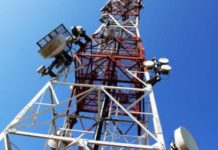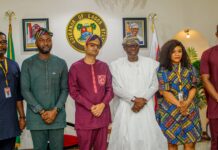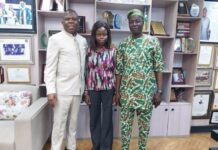Top ICT journalists, at a panel discussion on the oncoming 5G spectrum license took divergent views on the reserved price of $197.4 million ( approximately N75 billion) announced by the Nigerian Communications Commission ( NCC) on Wednesday.
The 5G license auction will take place on December 13,2021.
While some supported the position of the Mobile Network Operators ( MNOs) separately canvassed by them and their umbrella bodies, Association of Licensed Telecom Operators of Nigeria ( ALTON) and the Association of Telecommunications Companies of Nigeria ( ATCON), others disagreed, aligning with the regulators position.
The panel discussion took place at the eBusinessLife forum on GSM@20 and 5G, which held in Lagos this week.
The panel session had its topic as “5G: Adoption, Infrastructure, Service as critical Elements for Competitive Digitized Economy and 5G: Adoption, Infrastructure, Service as critical Elements for Competitive Digitized Economy.
The session was moderated by the Vice President at DigiVation Network, Mr. Hilary Damissah, and panelists made up of the Publisher, eWorldNews, Mr. Aaron Ukodie; Editor, ICT Desk at ThisDay Newspapers, Mr. Emma Okonji; Executive Secretary of the Association of Telecommunication Companies of Nigeria (ATCON), Mr. Ajibola Olude; and Chief Project Manager, Digital Encode Limited, Simileoluwa Oyediji, who represented the Founder/COO , Digital Encode Limited, Dr. Obadara Peter Adewale.
According to Ukodie the reserved bid price was appropriate as it was bench-marked with the pricing trend regime in other environments, and in accordance to the revenue potentials to licensees.
He noted that in some environments, though more advanced than Nigeria, operators paid up to $2 billion to acquire a 5G spectrum license.
According to him when in 2001 the NCC put the GSM spectrum license reserved price at $100 million, three operators eventually agreed to pay $285 million each to acquire the license, even though some argued tha price was too much.
Ukodie said those who argued then that $100 million was too high and withdrew from the auction, such as United Networks and MSI Celtel, regretted their actions. Mr Belo Osagie who was the brain behind United Networks had to partner Etisalat of United Arab Emirate to pay $400 million for the license in 2008.
At the time, as it is being canvassed on the 5G, many industry players argued the Nigerian environment would not generate enough revenue to pay off the investment in acquiring the license and deploying a nation GSM network and make profit.
Events proved them wrong, as those who took the bold step, at the time, Airtel and MTN smiled to the bank from the first year of operation. The International Telecommunications Union ( ITU) which carried out a survey at the time put Nigeria’s average revenue per users ( ARPU), which was $54 in 2003, as the highest in Africa, and of the highest in the world.
ARPU, one of the indices for measuring the performance of GSM operations, is highest in Nigeria for GSM operators, proving bookmakers right that Nigeria is a haven for telecom investments.
MTN International which often announced its results placed on its website illustrated the impressive ARPUs of GSM companies operating in Nigeria.
Today, Nigerian GSM companies “are reaping the benefits. The same may apply to 5G” according to Ukodie.
Infrastructure-wise, Ukodie said that InfraCos are expected to be the legs through which 5G can be deployed across the country. “For instance, we expect them to take fibre to our homes, public spaces or metropolitan networks for more seamless signals. But the inability of the InfraCos to rollout services should be looked into”.
On the price of Spectrum for 5G deployment, he argued that the Nigerian market is hungry for data hence the regulator and the operators should reach an agreement on the bidding price benchmark.
Okonji is of the view that NCC should review the price for 3.5GHz Spectrum downward to encourage telcos to bid for it.
Mr. Emma Okonji agrees that infrastructure is key. He said that from the telcos’ point of view, they declared readiness to deploy equipment for 5G.
According to him, the current price tag of N75 billion will likely discourage the telcos’ from participating in the bidding process.
Olude agreed with Okonji on the 5G reserved bid price arguing the current cost of the dollar does not encourage such huge investment on spectrum license as ” sourcing for dollar is too cumbersome”.
He said that the present economic climate in Nigeria discourages investments in the telecoms sector, especially with regards to the exchange rates fluctuations.
“We also need to consider the readiness of different State governments like the time GSM was introduced as they are critical stakeholders with regards Right of Way and other issues”, according to Olude.
He lamented the position of most State Governments which are yet to adhere to the N145 price cap per linear meter on Right-of –Way.
In his words, “Lagos State charges over N1000 per linear meter for fibre deployment. There is even charge disparity between mainland and Island (higher rates). So the Federal Government should engage more States to understand why the N145 cap should be maintained.
According to Oyediji while 5G will enable encryption and other privacy issues infrastructure remains critical. “Government needs to step in and normalize things. For instance, how many people can afford 5G smartphones. We need them to connect and make good uses of 5G.
“Innovation also comes with its own disruptions; therefore, service providers need to develop their own skills. We shouldn’t rely solely on international vendors for deployment. We need to groom local talents because 5G will drive IoT, autonomous vehicles and smart cities”.













